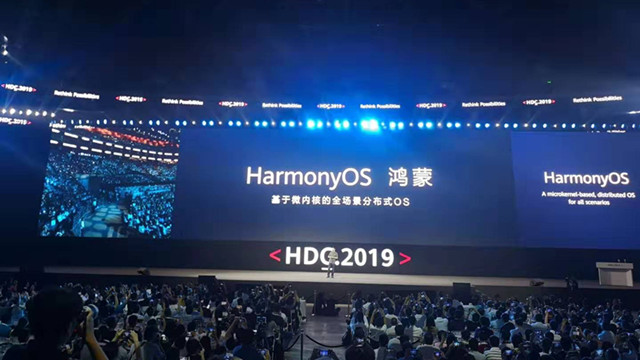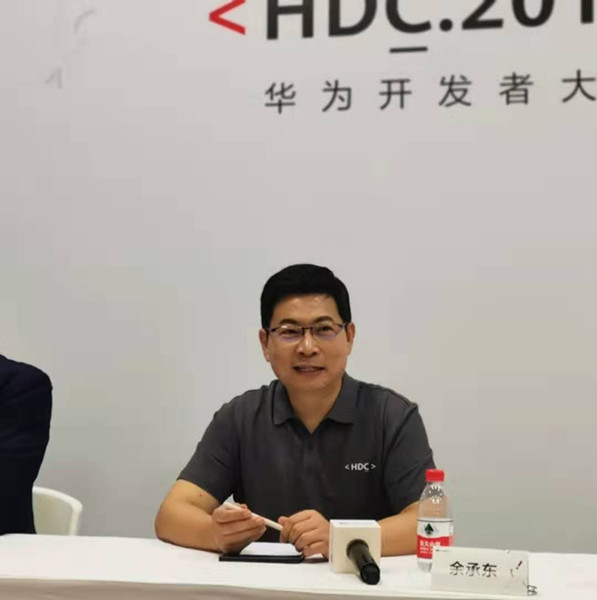Dialogue with Yu Chengdong: HarmonyOS, Big Vulnerability and Huawei’s Ecological Tough Battle
In the future, the whole world needs at least two sets of underlying systems. Once trust is lost, it is almost impossible to build it again. The beginning of American high-tech enterprises losing their monopoly advantage on the underlying system platform.
"In the future, the whole world needs at least two sets of underlying systems. Once trust is lost, it is almost impossible to build it again. American high-tech enterprises began to lose their monopoly advantage on the underlying system platform. " After watching the Huawei Global Developers Conference, a developer wrote this sentence on social media, and on this day, Huawei officially released the "HarmonyOS System".
On the afternoon of August 9th, Yu Chengdong, CEO of Huawei’s consumer business and managing director of Huawei Technologies Co., Ltd., officially unveiled the "final veil" for HarmonyOS in Dongguan. He said that this is the world’s first full-scene distributed OS based on microkernel, and its English name is harmony, which is a future-oriented operating system.

According to Yu Chengdong, the micro-kernel HarmonyOS system has been commercialized and will take the lead in using HarmonyOS OS 1.0 in the smart screen products launched this year. In the next three years, in addition to improving related technologies, HarmonyOS OS will be gradually applied to more intelligent devices such as wearable devices, smart screens and car machines.
"Every year, the terminal sells 300 million to 400 million terminals, and there are more than 200 million mobile phones. Compared with other manufacturers, we have the advantage of creating ecology." Yu Chengdong told reporters including CBN that the original plan was to release (HarmonyOS) next spring, but now he can only force himself to give full play to his ability. At present, the investment of R&D personnel in HarmonyOS is about 4,000, close to 5,000.
Mobile phone sales originally hit the top in the world.
Yu Chengdong mentioned in his speech that in the past eight years, the sales volume of Huawei’s consumer business has increased by 68 times, and it has become one of the top three suppliers of intelligent terminals from small and medium-sized manufacturers that can’t rank. Last year, the shipment volume of mobile phones reached 206 million units.
In the first half of this year, in the case of US sanctions, in Huawei’s consumer business, mobile phone shipments still maintained a 24% growth, reaching 118 million units, with 60 million units per quarter.
Yu Chengdong said that because of the sanctions, there were 10 million fewer units in the second quarter. "If there are no sanctions, I estimate that our shipments will be the highest in the world this year. In the case of sanctions, we still maintain rapid growth. " Yu Chengdong said, "Our market share has exceeded 35% in China, and the global market share has risen to 17.6%."
According to Huawei’s semi-annual report on Huawei’s performance in 2019, in the first half of this year, Huawei achieved sales revenue of 401.3 billion RMB, up 23.2% year-on-year and a net profit margin of 8.7%. Among them, the operator’s business income was 146.5 billion yuan, the enterprise business was 31.6 billion yuan, and the consumer business was 220.8 billion yuan. Huawei’s smartphone shipments (including glory) reached 118 million units, a year-on-year increase of 24%.
"The original global shipment was expected to be 300 million units, and now it is expected to be about 240 million units. Since June last year, overseas has surpassed the China market (sales volume). " Yu Chengdong told reporters that at present, 70% to 80% of overseas markets have recovered.
Maximum loophole
"Before May, Huawei’s revenue grew rapidly, ‘ Entity list’, because of the existence of market inertia, it has also achieved growth. However, Huawei still faces great difficulties. We need to invest a lot of manpower and material resources in version switching, supply continuity management, and ensuring delivery to global customers, which may have an impact on our future business performance. At the semi-annual media communication meeting on July 30th, Liang Hua, chairman of Huawei, said that just like that "rotten plane", Huawei still needs to continue to "patch up the hole".
Liang Hua said that at present, operators’ business has basically been "supplemented", and now the focus is on "filling the hole" in consumer business, and they still have to struggle for "survival".
When asked what is the biggest loophole in consumer business, Yu Chengdong replied without hesitation, "It is ecology. The ecology established by Android and Microsoft is the most difficult, but HarmonyOS can solve this problem."
Yu Chengdong said that HarmonyOS version 2.0 will be released next year, and version 3.0 the year after next, and HarmonyOS system will be first used in the glory smart screen.
"HarmonyOS OS can be used in watches and bracelets. Everyone asks me if I can use my mobile phone. I can use it at any time. In order to consider ecological reasons, Android is preferred. If Android can’t be used, HarmonyOS can be enabled at any time. HarmonyOS OS has stronger performance and security than Android. Distributed ability and full scene ability." Yu Chengdong said that we have moved from the Android ecosystem to HarmonyOS, and the development work is very, very small, which can be completed in one day or two, because HarmonyOS can achieve compatibility.

"With the advent of the era of full-scenario wisdom, Huawei believes that it is necessary to further improve the cross-platform capabilities of the operating system, including the ability to support full-scenario, cross-devices and platforms, and the ability to cope with low latency and high security challenges. Therefore, the prototype of HarmonyOS OS has gradually formed. It can be said that the starting point of HarmonyOS OS is different from that of Android and iOS. It is a brand-new distributed operating system based on microkernel, which can simultaneously meet the smooth experience of full-scenario, trusted security at the architecture level, and seamless collaboration across terminals. Yu Chengdong said that for the next generation of technology, enterprises in China no longer rely on (foreign companies).
Ecological "tough battle"
"The technical difficulty of being an operating system is not great, but the difficulty is ecology." In a recent interview, Ren Zhengfei told the First Financial Reporter.
The high ecological barrier of operating system is a difficult problem for "challenger".
From a global perspective, the current desktop operating system is still dominated by Microsoft. Microsoft’s Windows operating system accounts for more than 88%, and Apple’s Mac OS, the second largest operating system, accounts for 9%. Together, the two companies account for more than 97% of the operating system market, while domestic operating systems are all based on the secondary development of Linux system, which, together with other Linux systems, accounts for 2% of the market. In the mobile field, Google is the only one.
According to the data of Statcounter, a global website traffic monitoring organization, as of April 2019, in the mobile operating system, Google Android system accounted for 74.85%, Apple iOS accounted for 22.94%, and the rest platforms accounted for no more than 1%.
However, Yu Chengdong believes that HarmonyOS Eco has a huge amount of Huawei terminal support and has a better chance of success than other domestic operating systems.
"We believe that the launch of HarmonyOS OS will greatly enhance the vitality of the industry and the richness of ecology, and hope that the launch of HarmonyOS OS will bring more colorful experiences to the whole scene era. We welcome global developers to actively support HarmonyOS’s OS ecological construction and jointly create a full-scenario intelligent life experience for consumers. " Yu Chengdong said.
"The operating system is doing well, mainly in two aspects, one is performance, and the other is ecology. Performance is not a problem. Huawei itself is a big player in telecom equipment, with very successful and mature experience in special operating systems, and the domestic ecology can be slowly built. However, in the current situation, there are shortcomings in overseas APPlications, which is the app problem of Google. Other apps such as Facebook may also bring pressure. " An internal employee of Huawei told reporters that due to the richness of software in the ecological field, the number of China apps that can gain a foothold in the global market is still not too large.
Yu Chengdong told reporters that he hoped that Internet companies in China would regard the global market as an important step in their strategy, and also called for more Internet companies to go overseas.